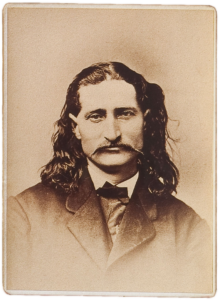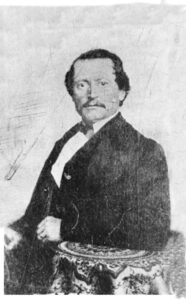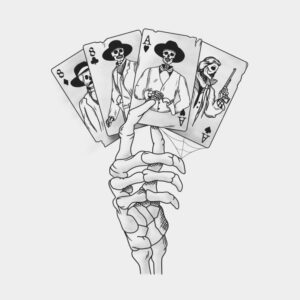Glossary Term
Dead Man’s Hand
Dead Man’s Hand
Used In: Poker
Introduction to Dead Man's Hand
In poker terminology, few phrases evoke as much intrigue and fascination as “Dead Man's Hand.” This enigmatic term conjures images of the Old West, saloons filled with smoke, and high-stakes card games played by rugged gamblers. But what exactly is Dead Man's Hand, and why does it hold such significance in the world of poker?
Dead Man's Hand refers to a specific hand of cards in poker, traditionally consisting of two pairs: aces and eights, typically with the fifth card unspecified or irrelevant. However, the true allure of Dead Man's Hand lies not only in its composition but also in the legends and lore that surround it. Join us as we dive into the history, composition, and cultural significance of Dead Man's Hand, unraveling the mysteries that have made it a legendary term in the world of poker.
Historical Origin of Dead Man's Hand


Wild Bill Hickok
The origins of Dead Man's Hand can be traced back to the American frontier during the late 19th century. The most widely accepted version of the story revolves around the infamous gunslinger and gambler, Wild Bill Hickok. According to legend, Hickok was playing poker in a saloon in Deadwood, South Dakota, on August 2, 1876. As the game unfolded, Hickok found himself holding a hand consisting of two black aces, two black eights, and an unspecified fifth card.


Jack McCall
In a twist of fate, Hickok was shot in the back of the head during the game, allegedly by Jack McCall, a disgruntled opponent seeking revenge. As Hickok lay slumped over the table, his hand frozen in death, it is said that the cards he held became forever associated with tragedy and ill fortune.
While the precise details of the event have been embellished over time, the story of Wild Bill Hickok and his fateful hand has become entrenched in poker lore. The tale of the Dead Man's Hand serves as a reminder of the dangers and uncertainties of life on the frontier, immortalizing both the man and the hand he held in death.
This historical origin story has contributed to the enduring fascination with Dead Man's Hand, elevating it from a mere poker term to a symbol of the Wild West's rough-and-tumble ethos. As we continue to explore Dead Man's Hand, it's important to acknowledge the role of history and legend in shaping its cultural significance.
Composition of the Dead Man's Hand
The composition of Dead Man's Hand is both simple and iconic. Traditionally, it consists of two pairs: aces and eights. However, the fifth card in the hand is often unspecified or irrelevant, adding an air of mystery to its makeup. This unique combination of cards is what distinguishes Dead Man's Hand from other poker hands and lends it its distinct identity.


While the identity of the fifth card in the Dead Man's Hand may vary depending on the retelling of the story, it is often depicted as inconsequential or left to speculation. Some interpretations suggest that the fifth card could represent the element of chance or fate that ultimately sealed Hickok's tragic fate.
Over the years, the composition of Dead Man's Hand has remained consistent, serving as a symbol of both the game of poker and the unpredictability of life itself. Whether viewed as a hand of ill omen or a testament to the enduring allure of the Wild West, Dead Man's Hand continues to captivate players and enthusiasts alike with its intriguing composition and rich history.
Significance in Poker Lore
Dead Man's Hand holds a unique place in the annals of poker lore, symbolizing both the thrill of the game and the specter of mortality. Beyond its historical origins, the term has become synonymous with bad luck and misfortune at the poker table, perpetuating its mystique among players. For many poker enthusiasts, the mere mention of Dead Man's Hand evokes a sense of caution and superstition. Some believe that being dealt this hand forebodes a string of bad luck or even impending doom, echoing the ill-fated fate of Wild Bill Hickok. This superstition has led some players to avoid Dead Man's Hand at all costs, fearing its purported curse.
Despite its ominous reputation, Dead Man's Hand also serves as a reminder of the inherent risks and uncertainties inherent in the game of poker. The element of chance, coupled with the strategic skill of the players, underscores the unpredictable nature of each hand dealt. In this sense, Dead Man's Hand embodies the essence of poker itself: a game of skill, luck, and fate. The cultural significance of Dead Man's Hand extends beyond the realm of poker, permeating popular culture and inspiring countless references in literature, film, and music. From Western novels to Hollywood films, the legend of Wild Bill Hickok and his fateful hand has left an indelible mark on the collective imagination, ensuring that Dead Man's Hand remains firmly entrenched in the public consciousness.
Notable References in Pop Culture
The legend of Dead Man's Hand has permeated popular culture, making its mark in literature, film, television, and music. References to this iconic poker hand can be found in a wide array of media, showcasing its enduring appeal and cultural significance. In literature, Dead Man's Hand has been featured prominently in Western novels and short stories, often as a symbol of the dangers and uncertainties of life on the frontier. Authors such as Louis L'Amour and Zane Grey have incorporated references to the hand in their works, adding an element of intrigue to their tales of adventure and suspense.
Similarly, Dead Man's Hand has made its way onto the silver screen, appearing in numerous Western films and television shows. From classic Hollywood westerns to contemporary dramas, the hand has been used to heighten tension and suspense in poker scenes, serving as a visual cue for audiences familiar with its storied history. In addition to its presence in literature and film, Dead Man's Hand has also found its way into the world of music. Countless songs and albums have been inspired by the legend of Wild Bill Hickok and his fateful hand, with artists ranging from country singers to rock bands paying homage to this enduring symbol of the Old West.
Whether portrayed as a harbinger of doom or a testament to the indomitable spirit of the frontier, Dead Man's Hand continues to captivate audiences around the world. Its presence in popular culture serves as a testament to the enduring power of myth and legend, ensuring that the legacy of Wild Bill Hickok and his infamous hand lives on for generations to come.
Conclusion
In conclusion, Dead Man's Hand stands as a testament to the intersection of history, legend, and popular culture within the world of poker. Originating from the Wild West and immortalized by the infamous poker game involving Wild Bill Hickok, this iconic hand of cards has captured the imagination of players and enthusiasts for generations.
From its humble beginnings in the dusty saloons of the American frontier to its enduring presence in literature, film, and music, Dead Man's Hand has transcended its origins to become a symbol of both the game of poker and the indomitable spirit of the Old West. Its composition, consisting of two pairs of aces and eights, evokes both intrigue and superstition, while its association with Wild Bill Hickok adds a layer of historical significance to its lore. Despite the passage of time, Dead Man's Hand continues to hold sway over the imaginations of poker players and enthusiasts, serving as a reminder of the risks and uncertainties inherent in the game. Either viewed as a bad omen or a source of fascination, Dead Man's Hand remains an enduring emblem of the timeless allure of poker lore. As we reflect on the history, composition, significance, and cultural impact of Dead Man's Hand, we are reminded of the rich tapestry of stories and legends that shape the world of poker.
The Top Online Casinos for Playing Poker
With user-friendly interfaces and seamless mobile compatibility, these online casinos provide players with unparalleled convenience and accessibility, allowing them to enjoy their favorite poker games anytime, anywhere.


Author
Gabriela Kirilova | Content Optimization Director








